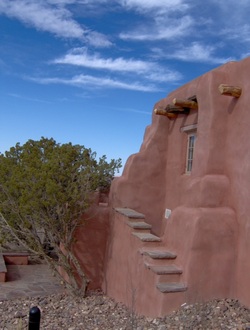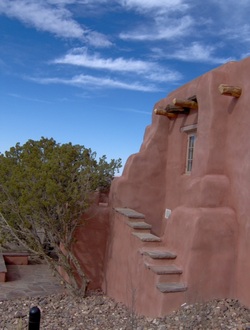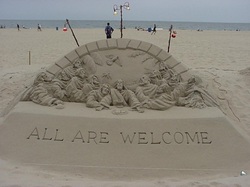
The adobe house: on the one hand, a nightmare for home buyers. Old natural materials - might mean rot, certainly means holes here and there for the scorpions and tarantulas and bats to enter, and lots of nooks and crannies for them to breed. Probably needs to be white(pink?)washed regularly, or at least maintained in some annual pain in the butt way. Electrical wiring? Of what is left over from the mice nibbling, it's probably coated with old rotting cloth or primitive cracked plastic, and of plumbing, all the horrors from a foul cesspool to lead pipes. In many ways, more a hobby than a home.
On the other hand: soft molding and coloration in conformity to the natural surroundings; the real look and feel of natural materials; a holistic extension of man into nature and nature into man. A house that is also soul food.
I don't know. I have had friends buy these old places and seen them come out with vast expenses for cracked foundations and termite rot. Yet, like the old English sports car that looks so cool even though it fouls its sparks every ten miles, we are attracted to such things. And unlike the old colonials and sports cars, this adobe is suited for the weather. It might survive decades without maintenance in the dry desert, the stucco will not rot, and it is cool in a temperature sense - it's very reason for being.
I have come to think about this after starting a biography of Fr. Bede Griffiths, mentioned some time before in this blog as a 20th century Catholic Priest who gained fame identifying in a very meaningful way the essence of Christianity with Hinduism. Some believe him a saint, and he undoubtedly was in at least one waay - that is, by realization of God the Absolute in himself and the world.
But I am not going in that direction now; instead, I want to focus on something brought up early in the biography - and that is, Griffith's detestation of modern (early 20th century England, where he was then a student at Oxford) architecture and aesthetics in general. At that time, factories continued to push into the countryside, followed by the cheap housing needed for the poorly paid workers. Everything about this screamed "ugly" and to Griffiths, this epitomized modernity. For him, what we built on the outside reflected our inside - and what we lived on the outside affected our inside. That, then, is our vicious cycle, a feedback of negativity that takes us further and further from nature and our natural - and divine - roots.
I thought about this as I drove back from my walk this morning, and yes, the newer the structure, the uglier in general it was. This is farm country, and I could use the grain silos as a great "for instance." The oldest are made from the rock and earth from the surrounding countryside. The earth was not as high-grade as that used for commercial cement, so most of the few that are left need repair, but they are without doubt the best of the bunch, setting into the countryside with a natural charm. Next came the cement silos, not so pretty but solid and subdued in coloration - and topped, at least, with wood roof and shingles. Then the steel silos, garish against the earth and mud and grass, but representing, at least to me, at least a non-toxic permanence. Last and very much least, the "white worms," tubes of plastic stuffed with silage that simply lay on the ground waiting for the tractor shovel to rip off a slice. Grotesque in every way, but by far the cheapest and easiest and, we can add, the least dangerous of the bunch for storing and distributing silage.
Serviceable, in other words. Ugly, cheap, but efficient.
We can use those words to sum up all modern structure and commerce, but does is sum up the modern mind? Is the outside a reflection of the inside and vice-versa?
Yes and no. Yes in so many ways, the most notable being our language, which expresses our very ideas and forms the root of who we think we are. Years ago when I started to look up words, I was struck by the original depth of meaning so many words had - how they corresponded to essential natural elements or cosmic thoughts. Modern usage has made them flat and utilitarian. As an outrageous example, take the word "awesome." We still know what that means but we almost never use it as such - instead it has become a footstool in language, like "OK." In effect, meaning has been sleeked down for easy usage, with a corresponding loss of depth. And never mind vulgarity, which is now as common among women and small children as it once was in the working man's world. Even those - even vulgar words - have roots in deeper meaning. In fact, in all my studies of primitive cultures I don't recall any reference to vulgar language. It is my belief that they had none. While tone might reflect displeasure, what words represented - the world of these people - was simply beyond vulgarity (how, for instance, did all but clinical language about sex become vulgar?)
The "yes" of flat, ugly utilitarianism in ourselves can continue - obviously to art and architecture, as well as to our world view in general, or what I have been referring to continually in the blog as a "flat" epistemology (that is, mode of thought).
However, we do have a saving grace, at least as I see it. While the primitives (again, as in "primal" or "first" - no disrespect intended whatsoever) and early civilized (as in civic, "city") peoples connected directly to greater meaning, it seems they did so from a different sort of flat perspective - that is, without reflection. This I see as our strength - that we do not simply follow tradition or the rules without reflecting on how these might affect people other than ourselves; for instance, the Jews in the New Testament would thoughtlessly have stoned the adulterous woman without conscious reflection on their own hypocricy - and on the life of the woman herself as an individual.
I am not alone in noticing this difference - in anthropology, they call it a move from "shame" (based on exterior actions, words and so on) to "guilt" (based on internal reflection). We could write books on it, but for here it occurs to me that Christianity met the demise of meaning in civilized culture with an increase in the depth of the individual. Like much of Christianity, this seems a contradiction, for we are supposed to love our brother as ourselves - that is, see LESS individual distinction - but a little thought proves, I think, that the route to oneness has to go through the atomization of the social body through individuation. And yet - is this not why our social systems are falling apart? More contradiction, but through that might be seen The Way - and why we must suffer an apocalyptic collapse before we rise again from the ashes. FK
(There will be a pause of several days in the blog for Spring Break. Happy surfing!)


 RSS Feed
RSS Feed